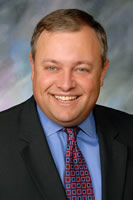In order to provide equal access and equal opportunity to people with diverse abilities, this site has been designed with accessibility in mind. Click here to view
Coffee Renews Call for AG to File Suit
 Sen. Glenn Coffee
Sen. Glenn Coffee
OF CHALLENGE TO FEDERAL HEALTH CARE LEGISLATION
Congress “Lacks Constitutional Authority” to Require Individuals to Purchase Insurance
Attorney General Drew Edmondson would have “strong grounds for challenging the constitutionality” of the health care reform passed by Congress last week, according to a respected constitutional law professor at the University of Oklahoma. In response, Senate President Pro Tem Glenn Coffee renewed his call for Edmondson to stand up for Oklahoma citizens and file suit against the federal government.
”I believe an overwhelming number of Oklahomans want us to challenge the passage of Obamacare,” Coffee said. “We cannot afford to sit this one out.”
In a memo to Coffee, Michael Scaperlanda, the Gene and Elaine Edwards Family Chair in Law and Professor of Law at the OU College of Law, asserts that “Congress lacks the constitutional authority and power to require individuals to engage in economic activity.” Scaperlanda stops short of predicting the outcome in a court action against the federal government, but says there is a strong case to be made against the legislation.
After passage of the heath care reform in the US House of Representatives last week, Senator Coffee and House Speaker Chris Benge called upon Oklahoma Attorney General Drew Edmondson to join in the lawsuit filed by fifteen other states, challenging the constitutionality of the law. At this point, Edmondson has refused to act.
“Professor Scaperlanda is a highly respected voice in constitutional law,” said Coffee, “and he lays out a compelling argument for action against the federal government.”
“The media has sought out the same old liberal legal “experts” in the past week who claim the state has no standing to challenge this law,” Coffee continued. “I think it’s important for Oklahomans to know that there are other voices out there that see a legitimate case for our Attorney General to join the bipartisan group of fifteen other courageous AG’s across the nation in standing up against this encroachment on personal liberty and this budget busting measure for every state in the nation.”
Scaperlanda cites several cases for precedent, including United States v. Morrison (2000), in which the Court said: “Thus far in our Nation’s history our cases have upheld Commerce Clause regulation of intrastate activity only where that activity is economic in nature.” Scaperlanda notes that Morrison and other cases “struck down congressional acts regulating non-economic activity that arguably affected interstate commerce.”
In relating that to federal health care reform, he states, “Some might argue that the decision not to engage in economic activity -- not to purchase insurance in this case – is itself a form of economic activity, but seems to push the limits of credulity.”
Scaperlanda cites other cases involving interstate commerce, and notes that “there is no interstate market in health insurance.”
“There are very strong arguments that the individual insurance mandate is unconstitutional as beyond Congress’ power to regulate interstate commerce.”
Finally, Scaperlanda cites New York v. United States, 505 U.S. 144 (1992) and z v. United States, 521 U.S. 898 (1997) in stating a precedent that establishes that “unfunded mandates and the commandeering of the states for federal purposes constitute unconstitutional infringements on state sovereignty.”
The Court said in New York v. US, “…the Constitution has never been understood to confer upon Congress the ability to require the States to govern according to Congress’ instructions.”
Scaperlanda concludes that “there are serious and strong grounds for challenging the constitutionality of the Act” (federal health care).
“I thank Professor Scaperlanda for his thoughtful research on this matter. I believe it is past time for our Attorney General to do the right thing for the citizens of our state in the face of this unconstitutional act imposed by our federal government and join with the other Attorneys General in filing suit against the federal government,” Coffee concluded.
 Oklahoma Senate
Oklahoma Senate

